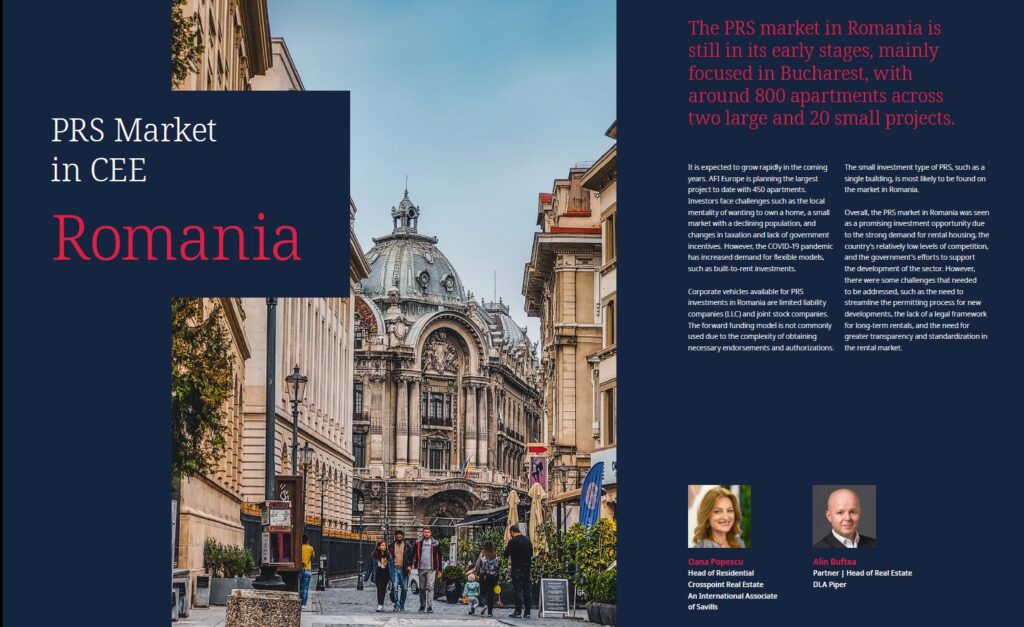DLA Piper & Savills launched before MIPIM the report on the Private Rented Sector (PRS) in CEE.
Within this report, you will find a comprehensive overview of the PRS market in CEE, with each chapter devoted to an individual country. The past, present, and future of the PRS market in each jurisdiction are analyzed as well as legal and tax issues to consider. Finally, there is a chapter about ESG and how it is being incorporated into the PRS market.
The PRS market in CEE faces common challenges such as regulatory uncertainty, difficulty qualifying for financing, and identifying quality assets. Investors must carefully consider the form of the project company, location and zoning, and due diligence before initiating a PRS project in the region. Despite these challenges, investors are attracted to the market due to the strong demand for rental housing and relatively low levels of competition.
Looking to the future, the PRS market in CEE presents significant opportunities for growth. The COVID-19 pandemic has accelerated the trend of people seeking more flexible and affordable housing options, and the PRS market is well-positioned to meet this demand. Investors must navigate the challenges unique to each jurisdiction, but with careful consideration, the PRS market in CEE presents a promising investment opportunity for the future.
Developing sustainability
ESG requirements are also playing a growing role in the PRS market, with investors increasingly focused on building sustainability, self-sustainability, and the well-being of tenants. Given the lack of modern rental assets and the old age of existing housing stock in some CEE countries, the PRS market may soon become a leader in sustainability in the region.
Read the report to learn more about the PRS market in CEE – here.
PRS MARKET IN CEE | PAST, PRESENT AND FUTURE
- Austria has a well-established PRS market, driven by demand for rental housing, low-interest rates, and tax incentives. Investors are now focusing on micro-living for young professionals and student housing.
- The Czech Republic is seeing growth in the market due to high real estate costs and a housing shortage. In Prague, around 4,780 units are currently available, and more are under construction.
- Poland’s PRS market is rapidly expanding, driven by a younger generation’s preference for renting due to high apartment prices and a lack of affordability. The total investment in the PRS sector in Poland exceeded EUR1.8 billion by the end of 2022, with nearly EUR750 million recorded in 2021.
- Hungary’s market is still emerging, but a cultural preference for homeownership, high financing costs, and low yields pose significant challenges.
- Romania’s market is small and still in its early stages, but affordable housing shortages and changing attitudes towards renting present potential opportunities for growth.
The PRS market in Romania is still in its early stages, mainly focused in Bucharest, with around 800 apartments across two large and 20 small projects.
It is expected to grow rapidly in the coming years. AFI Europe is planning the largest project to date with 450 apartments. Investors face challenges such as the local mentality of wanting to own a home, a small market with a declining population, and changes in taxation and lack of government incentives. However, the COVID-19 pandemic has increased demand for flexible models, such as built-to-rent investments.
Corporate vehicles available for PRS investments in Romania are limited liability companies (LLC) and joint stock companies. The forward funding model is not commonly used due to the complexity of obtaining necessary endorsements and authorizations.
The small investment type of PRS, such as a single building, is most likely to be found on the market in Romania.
Overall, the PRS market in Romania was seen as a promising investment opportunity due to the strong demand for rental housing, the country’s relatively low levels of competition, and the government’s efforts to support the development of the sector. However, there were some challenges that needed to be addressed, such as the need to streamline the permitting process for new developments, the lack of a legal framework for long-term rentals, and the need for greater transparency and standardization in the rental market.
Savills is a leading international consulting firm operating on the real estate market. It was established in 1855 in the United Kingdom. With a network of over 700 offices in the Americas, Europe, Africa, the Asia-Pacific region, and the Middle East, it offers a wide range of professional consultancy, management, and transaction services.
